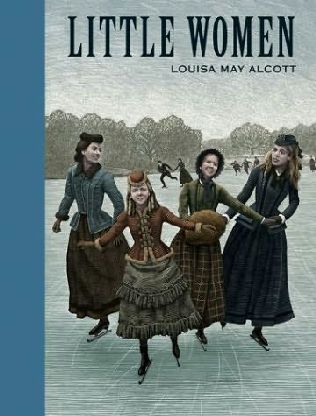
How Little Women Betrayed Its Women — And Everyone Else
Written by: Beth Woodward, CC2K Books Editor
 So I was in Barnes & Noble recently, shopping for a gift for a young relative. I was looking in the section of classic children’s books, when I saw it: an abridged version of Little Women.
So I was in Barnes & Noble recently, shopping for a gift for a young relative. I was looking in the section of classic children’s books, when I saw it: an abridged version of Little Women.
When I was about seven years old, I got a book of abridged versions of classic children’s books from the 19th century: Black Beauty, The Secret Garden, What Katy Did, and…Little Women. Little Women was the first book I read, and the one I devoured most voraciously. Why this one in particular? In my seven-year-old mind, the logic was simple: it was the book that featured a character named Beth. With a lead character named Beth, how could I go wrong?
Poor Beth didn’t have it easy in the book. She was so shy she couldn’t even talk to anyone, and she spent much of the book sick with scarlet fever. (To this day, I’m not exactly sure what scarlet fever is.) But names aside, the character I related to most was Jo, who wrote stories and never quite fit in. The book ended on a happy note: Beth got better, and Papa March came home from the Civil War. All was well in the 19th century.
Years later, I found out that Little Women didn’t have such a happy ending. Turns out, my “abridged” version cut off after the first half of the book. In the second half, Beth dies, Jo gives up her writing, gets married to a stick-in-the-mud, and living the kind of life she dreaded as a teenager.
It was horrible! I felt betrayed! Not only Alcott killed off Beth, she made Jo give up her dream of becoming a writer for a life she never wanted…and with Professor Bhaer, of all people! Maybe if it had been Laurie, it would have been a little bit better, but Professor Bhaer? What exactly did he have to recommend him as a character? Poor Laurie ended up with selfish, spoiled Amy. Regardless, the message was clear: Jo had to put away childish things (writing) to grow up, get married, and raise a family.
Granted, I resent Little Women a little bit more because of the bait-and-switch my childhood copy pulled on me (perhaps not so coincidentally, the copy I saw recently ended at the same place). But it seemed to be a theme of many of my childhood favorites. Anne of Green Gables: Anne grows up, gets married to Gilbert, and gives up both teaching and writing. A Wrinkle in Time: Meg Murray grows up, gets married to Calvin O’Keefe, and gives up a brilliant mathematical career so she won’t give her children inferiority complexes. (Seriously, that is actually what happened.)
Granted, these series are dated, and they reflect norms that have changed significantly in the last several decades. But it seems to reflect a prevailing trend, not only in literature but in life. Kids get to have the dreams, while adults need to give them up.
And that, quite frankly, sucks. Why should we have to give up our dreams just because we grow up? Yet that’s the culture we have—and for once, I’m not just talking about a feminist issue. No, this is something both males and females are bombarded with (though admittedly, I still think males and females are given a different set of expectations).
For years, people have asked me what my long-term goals are. “I want to be a fiction writer,” I’d tell them. “Oh, that’s nice,” they’d say, “but what are you really going to do?” Time and time again, people have told me it’s time to grow up, settle down, and lock myself into a real career.
But why should I have to give up my dreams? Why should anyone? If you don’t have anything left to dream about, what do you have that’s worth living for? Look, you can have a regular job with a regular paycheck, but that doesn’t mean you have to stop painting or writing or playing bongo drums or whatever.
But over and over again, that’s what we hear in our children’s literature. Kids have dreams. Grown-ups have responsibilities. It sucks. And I’m tired of it.
So I say we take back the literature. Kids can dream. Adults can dream, too. And the cool thing about being an adult is that you can actually work to make these dreams happen. We should reflect that in our coming-of-age books. Let’s let the kids who dream become adults who dream, both in real life and in fiction.
So I skipped over Little Women. Hell if I would pull the same bait-and-switch on some child that was pulled on me. I got The Secret Garden instead.
